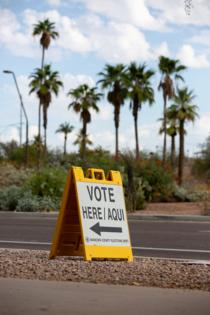Supreme Court says Arizona can require proof of citizenship to register voters in federal races
Published in Political News
WASHINGTON — A divided Supreme Court on Thursday ruled that Arizona may require proof of citizenship when registering new voters for future elections.
But the court refused a GOP request to block voting in November by more than 40,000 people who had already registered without providing such proof.
The court issued a one-paragraph order and did not explain its ruling, which arose from an emergency appeal filed by the Republican National Committee.
The decision is unlikely to have a significant effect on the presidential race in Arizona. But it breaks new ground by affirming that states may require proof of citizenship when they register all new voters through their state system.
Voting rights experts said Arizona will be the only state enforcing a proof-of-citizenship requirement for would-be voters.
It also shows the sharp split within the highest court on how to handle partisan disputes over election rules.
Conservative Justices Clarence Thomas, Samuel A. Alito Jr. and Neil M. Gorsuch said they would have granted the full appeal from the RNC and held that thousands of Arizonans could be barred from voting this year because they did not show proof of citizenship.
Such a decision would have all but overturned a 2013 opinion written by the late Justice Antonin Scalia. Writing for a 7-2 majority, he said Arizona and other states must “accept and use” the federal registration form created by the National Voter Registration Act of 1993. It requires voters to sign a sworn statement confirming their citizenship but does not require that they show a birth certificate or passport.
Arizona says it has about 41,000 voters who registered using this federal form.
In response to the ruling, Arizona Secretary of State Adrian Fontes said that “Arizona’s law requiring documentary proof of citizenship for voter registration is reinstated. Counties will reject new state forms missing documented proof of citizenship. Voters may still register using the National Mail Voter Registration Form, which requires an attestation of citizenship under penalty of perjury.”
Justices Elena Kagan, Sonia Sotomayor, Amy Coney Barrett and Ketanji Brown Jackson said Thursday that they would would have denied the RNC appeal entirely.
Speaking for a coalition of 24 Republican-led states, West Virginia Attorney General Patrick Morrisey called the decision a “great victory for the rule of law and the integrity of our elections. This is a commonsense law. You should not be allowed to vote if you’re not a United States citizen, and having proof of your citizenship is vital in making sure we conduct free, safe and lawful elections.”
Danielle Lang, voting rights lawyer with the Campaign Legal Center, said it was disappointing the court agreed to change the rules on the eve of the election. “If the court is going to weigh in on eleventh-hour election law challenges, it needs to enforce the principle against last-minute changes evenhandedly. This decision fails to do that.”
The justices usually frown on lawsuits or appeals that seek to change voting rules in the weeks before an election.
In this instance, Arizona’s Republican leaders were seeking to enforce a new law that would forbid voting by Arizonans who do not show a birth certificate or passport when they register.
A federal judge in Phoenix had blocked the 2022 law from taking effect because it clashed with the federal “motor voter” law.
Following that ruling, Arizona adopted a two-track system of voter registrations. Residents who registered to vote in state and local elections were required to show proof of their citizenship.
Those who registered through the federal form signed a sworn statement that they were U.S. citizens. These “federal only voters” were allowed to cast ballots only for members of Congress and the president.
The state later agreed in a 2018 consent decree to give full registration to new voters whose residence and citizenship could be confirmed through its motor vehicles department database.
But two years ago, the Republican-controlled Legislature passed a new law to prohibit registered voters who did not provide proof of their citizenship from casting ballots in a presidential election.
The Justice Department and voting rights advocates sued to challenge the law. Last year, U.S. District Judge Susan Bolton held a 10-day trial in Phoenix, and she blocked enforcement of the new proof-of-citizenship requirement.
The 9th Circuit Court of Appeals, by a 2-1 vote, refused to lift her order.
The RNC, the Arizona Senate and the speaker of the state assembly filed an emergency appeal with the Supreme Court on Aug. 8. They argued that the Arizona Legislature has the final authority to decide who can vote in the state’s elections.
But the Arizona attorney general and secretary of state, both Democrats, urged the court to turn down the appeal.
Fontes, the secretary of state, told the court a ruling upsetting the current registration rules would “create chaos and confusion.” He said newly registered voters who used the federal form would be disenfranchised, along with “the 42,301 federal-only registrants” who will not be able to vote in the presidential election.
_____
©2024 Los Angeles Times. Visit at latimes.com. Distributed by Tribune Content Agency, LLC.




























































Comments